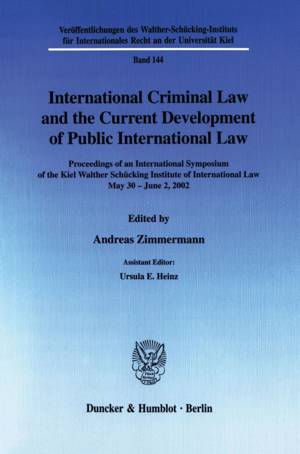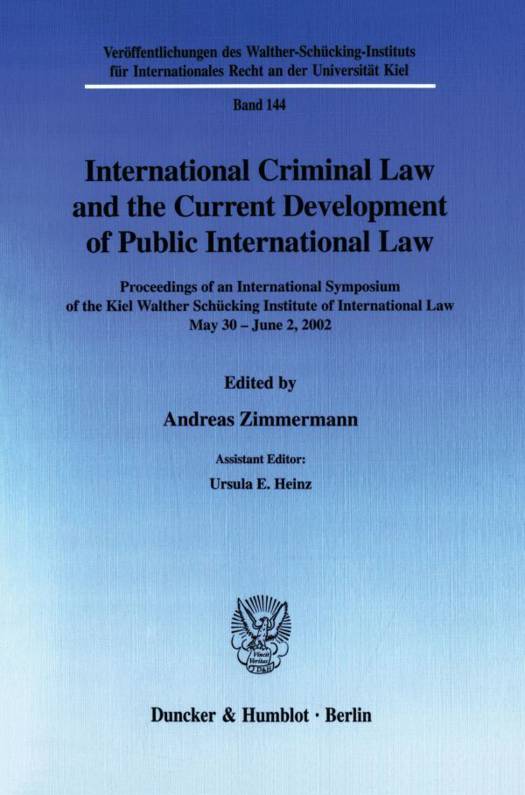
- Retrait gratuit dans votre magasin Club
- 7.000.000 titres dans notre catalogue
- Payer en toute sécurité
- Toujours un magasin près de chez vous
- Retrait gratuit dans votre magasin Club
- 7.000.0000 titres dans notre catalogue
- Payer en toute sécurité
- Toujours un magasin près de chez vous
International Criminal Law and the Current Development of Public International Law
Proceedings of an International Symposium of the Kiel Walther Schucking Institute of International Law May 30 - June 2, 2002
175,95 €
+ 351 points
Description
International Criminal Law is one of the most vibrant and fast developing areas of international law. It is against this background that the Walther Schücking Institute at Kiel University organized a symposium aiming at analyzing whether and if so, to what extent international criminal law is exercizing influence on general public international law or whether international criminal law has instead become a separate field of law of its own with its specific methods and which therefore no longer is part of general international law.
This volume contains all presentations given during the conference as well as the discussions that took place. Speakers include Hans-Peter Kaul, currently judge at the International Criminal Court, who outlines the current challenges for the newly established Court as well as Wolff Heintschel v. Heinegg (Frankfurt/O.) who raises the question whether the traditional methods in developing new rules of customary international law are still valid with regard to international criminal law, taking into account in particular the fast developing jurisprudence of the two ad hoc Tribunals created by the Security Council and potential conflicts with the role of State practice as traditionally understood. Jan Klabbers (University of Helsinki) focuses on the role of third States, in particular the role of third States not parties to the Statute of the International Criminal Court, where he highlights the conflict between the traditional pacta tertiis rule and more modern approaches and understandings of international law. In a similar vein, Christine Chinkin (London School of Economics) demonstrates to what extent feminist approaches to international law have shaped our understanding of international criminal law and raises the question whether this development is part of an overall and more generalized movement. Finally, Leila Sadat (Washington University School of Law, St. Louis, Missouri) addresses the difficult question of the relationship between on the one hand international criminal prosecutions and on the other hand alternative forms of redress, such as e.g. amnesties or pardons, particularly taking into account restraints derived from general notions of international law such as the notion of 'jus cogens' and treaty obligations to punish such international crimes.
This volume contains all presentations given during the conference as well as the discussions that took place. Speakers include Hans-Peter Kaul, currently judge at the International Criminal Court, who outlines the current challenges for the newly established Court as well as Wolff Heintschel v. Heinegg (Frankfurt/O.) who raises the question whether the traditional methods in developing new rules of customary international law are still valid with regard to international criminal law, taking into account in particular the fast developing jurisprudence of the two ad hoc Tribunals created by the Security Council and potential conflicts with the role of State practice as traditionally understood. Jan Klabbers (University of Helsinki) focuses on the role of third States, in particular the role of third States not parties to the Statute of the International Criminal Court, where he highlights the conflict between the traditional pacta tertiis rule and more modern approaches and understandings of international law. In a similar vein, Christine Chinkin (London School of Economics) demonstrates to what extent feminist approaches to international law have shaped our understanding of international criminal law and raises the question whether this development is part of an overall and more generalized movement. Finally, Leila Sadat (Washington University School of Law, St. Louis, Missouri) addresses the difficult question of the relationship between on the one hand international criminal prosecutions and on the other hand alternative forms of redress, such as e.g. amnesties or pardons, particularly taking into account restraints derived from general notions of international law such as the notion of 'jus cogens' and treaty obligations to punish such international crimes.
Spécifications
Parties prenantes
- Editeur:
Contenu
- Nombre de pages :
- 254
- Langue:
- Anglais
- Collection :
- Tome:
- n° 144
Caractéristiques
- EAN:
- 9783428110919
- Date de parution :
- 06-03-03
- Format:
- Livre broché
- Format numérique:
- Trade paperback (VS)
- Dimensions :
- 155 mm x 231 mm
- Poids :
- 348 g

Les avis
Nous publions uniquement les avis qui respectent les conditions requises. Consultez nos conditions pour les avis.





